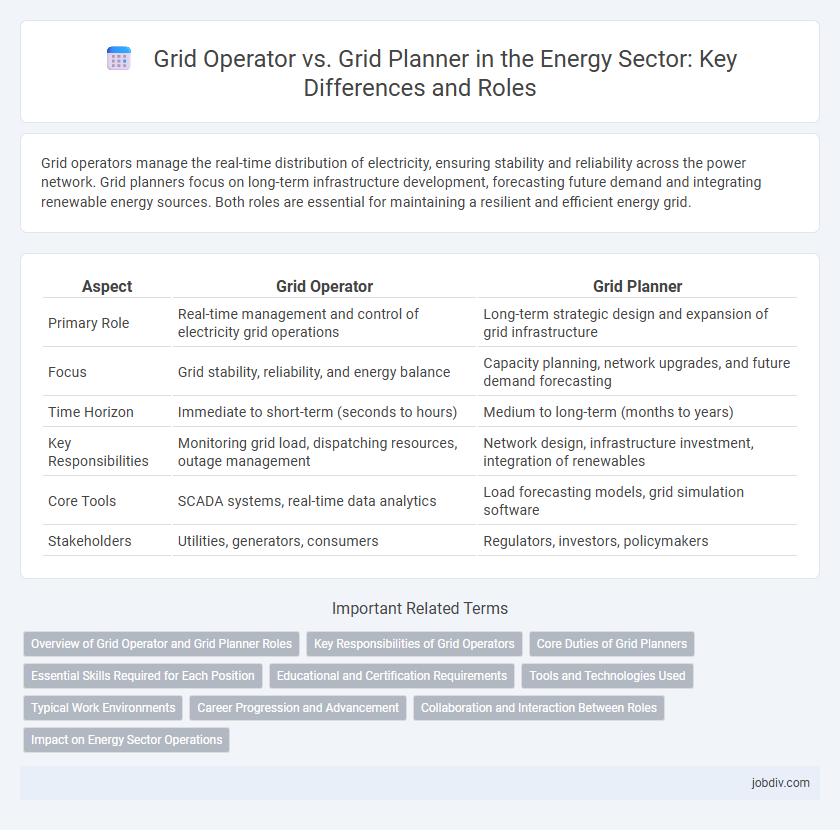Grid operators manage the real-time distribution of electricity, ensuring stability and reliability across the power network. Grid planners focus on long-term infrastructure development, forecasting future demand and integrating renewable energy sources. Both roles are essential for maintaining a resilient and efficient energy grid.
Table of Comparison
| Aspect | Grid Operator | Grid Planner |
|---|---|---|
| Primary Role | Real-time management and control of electricity grid operations | Long-term strategic design and expansion of grid infrastructure |
| Focus | Grid stability, reliability, and energy balance | Capacity planning, network upgrades, and future demand forecasting |
| Time Horizon | Immediate to short-term (seconds to hours) | Medium to long-term (months to years) |
| Key Responsibilities | Monitoring grid load, dispatching resources, outage management | Network design, infrastructure investment, integration of renewables |
| Core Tools | SCADA systems, real-time data analytics | Load forecasting models, grid simulation software |
| Stakeholders | Utilities, generators, consumers | Regulators, investors, policymakers |
Overview of Grid Operator and Grid Planner Roles
Grid operators manage the real-time stability and reliability of the electrical grid, coordinating power generation, transmission, and distribution to balance supply and demand continuously. Grid planners focus on long-term infrastructure development by designing and forecasting capacity needs, integrating renewable energy sources, and ensuring future grid resilience. Both roles are essential for maintaining efficient, reliable, and sustainable energy delivery systems.
Key Responsibilities of Grid Operators
Grid Operators manage real-time electricity flow and maintain grid stability by balancing supply and demand across the network. They monitor grid conditions continuously to prevent outages and coordinate emergency responses during disruptions. Their responsibilities also include implementing dispatch instructions and ensuring compliance with regulatory standards to guarantee reliable energy delivery.
Core Duties of Grid Planners
Grid planners are responsible for designing and forecasting the expansion and reinforcement of electrical grids to ensure long-term reliability and capacity. They analyze demand growth, integrate renewable energy sources, and assess infrastructure investments to optimize grid performance. Their core duties include grid modeling, scenario analysis, and regulatory coordination to support sustainable and resilient energy systems.
Essential Skills Required for Each Position
Grid Operators require real-time analytical skills, proficiency in SCADA systems, and rapid decision-making abilities to maintain grid stability and respond to fluctuations. Grid Planners focus on long-term strategic thinking, expertise in load forecasting, and knowledge of regulatory requirements to design resilient and efficient energy networks. Both roles demand strong communication skills and a deep understanding of power systems to ensure seamless coordination and energy distribution.
Educational and Certification Requirements
Grid operators typically require certifications such as NERC System Operator Certification and specialized training in real-time grid management, focusing on operational reliability and emergency response. Grid planners often hold advanced degrees in electrical engineering or energy systems along with certifications in project management and grid infrastructure planning. Both roles demand continuous education to stay updated with evolving energy regulations, smart grid technologies, and cybersecurity standards.
Tools and Technologies Used
Grid operators rely on real-time monitoring systems combined with SCADA (Supervisory Control and Data Acquisition) technology to manage electricity flow and ensure grid stability. Grid planners utilize advanced simulation software and Geographic Information Systems (GIS) to design infrastructure expansions and forecast future energy demands. Both roles increasingly integrate AI-driven analytics and smart grid technologies for enhanced decision-making and operational efficiency.
Typical Work Environments
Grid Operators typically work in control rooms where they monitor real-time electricity flow and ensure system stability using SCADA systems and advanced software tools. Grid Planners operate in office environments, conducting load forecasting, infrastructure expansion, and capacity analysis through simulation models and long-term planning software. Both roles demand collaboration with utility companies, regulatory bodies, and field engineers to maintain reliable and efficient energy distribution.
Career Progression and Advancement
Grid Operators monitor and manage real-time electricity flow, ensuring stability and responding to outages, providing foundational experience in energy systems and crisis management. Grid Planners design long-term infrastructure and capacity strategies, leveraging advanced analytics and forecasting to support sustainable grid development, often requiring specialized education and strategic thinking skills. Career progression typically moves from operator roles to planning positions, with advancement opportunities expanding into project management, policy development, and leadership within utility companies and regulatory agencies.
Collaboration and Interaction Between Roles
Grid operators and grid planners collaborate closely to ensure reliable and efficient power system management, with operators managing real-time grid stability while planners focus on long-term infrastructure development. Effective interaction facilitates data sharing on load forecasts, grid constraints, and maintenance schedules, enabling proactive responses to demand fluctuations and integration of renewable energy sources. This synergy supports optimized grid performance, reducing outages and enhancing energy security across the network.
Impact on Energy Sector Operations
Grid operators manage real-time electricity flow to maintain stability and prevent outages, directly influencing operational efficiency and reliability in the energy sector. Grid planners design infrastructure upgrades and expansions, shaping long-term capacity and resilience against demand growth and renewable integration. Their combined roles ensure continuous power delivery and strategic adaptation to evolving energy landscapes.
Grid Operator vs Grid Planner Infographic

 jobdiv.com
jobdiv.com